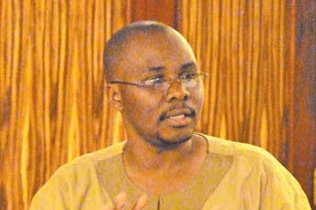Julius Kaggwa, director of Support Initiative for People with Atypical Sex Development, was one of thousands in town last week for the Philadelphia Trans-Health Conference, bringing his experience advocating for LGBT people in his home country of Uganda. Kaggwa was also in Philadelphia on behalf of the American Jewish World Service, an organization that he has worked with in advocating for LGBTI equality in Uganda. AJWS is dedicated to alleviating poverty, hunger and disease among people across the globe.
Kaggwa is intersex and focuses his work on Uganda’s intersex adolescent and adult populations, drawing on his own life experiences.
Kaggwa said his coming out started when he informed his family that he was male, although they had been raising him as female for the first several years of his life.
“I went to missionary school and it was an all-girls school. I was in that school not as a girl, but dressed as a girl, so that was really huge,” he said. “It was a very well-known school and I went to a very well-known evangelical church as well, so news of the fact that this prestigious girls school had a boy in there was huge and many people received it differently.”
Kaggwa said people on the street would often ask him where his sister was.
“It was very difficult and on several occasions I actually felt suicidal because I didn’t think what I see now was possible. I didn’t even think I would be able to live in my own country,” he said. “But sharing my story and my experiences with my own friends helped and then I started to get support from my own family and I think that was the major positive for me. My family was very supportive right from my childhood when they were hiding me and trying to figure out how to handle this intersex issue. I’ve always been very supported.”
Kaggwa has been at the forefront of the fight against the “Kill the Gays” bill, which would instate the death penalty for some violations of the country’s anti-homosexuality law, that has been debated in Uganda and testified in front of Congress in 2010 about his experiences.
Although Kaggwa does not identify as gay, he said he feels passionate about this bill because it could affect his friends and colleagues.
“I cannot imagine someone telling me that they are going to kill my lesbian friend just for being who they are. There is no reason why I am going to keep quiet about this. I may not be gay, but I am a sexual minority and I know what it is like to be pushed around and actually feel like taking your own life and if someone is making it easier by telling legislators to take your life for you, I don’t think that is something I can keep quiet about. It is both a passion and a duty.”
In Uganda, Kaggwa said the environment for LGBT men and women is different, with men often seeing the most outward violence, yet women often subjected to sexual violence.
“Most of the hatred targets gay men and I think that might have something to do with our culture. We think men should be a symbol of strength and they should be dominating and asserting their maleness and having sex with women and making lots of children. So when a gay male, especially an effeminate gay male, comes across as wanting to defy this norm, society is more up in arms. Then, in many circles when it comes to abuse and violence, it is mostly the women because men rape them to try and normalize them. They try to assert that patriarchy.”
Kaggwa said increased American support is needed to ensure the bill does not become a reality.
“We need to put pressure on faith extremists here who are sending hate influence back to our country and engage our parliamentarians and make sure the bill never goes through and is never debated,” he said.
